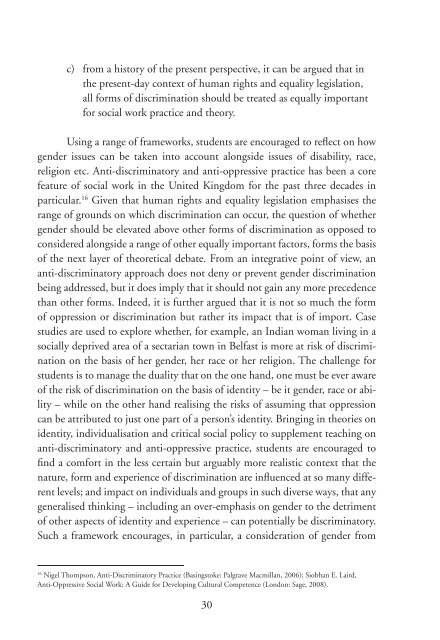Teaching Gender in Social Work - MailChimp
Teaching Gender in Social Work - MailChimp
Teaching Gender in Social Work - MailChimp
You also want an ePaper? Increase the reach of your titles
YUMPU automatically turns print PDFs into web optimized ePapers that Google loves.
c) from a history of the present perspective, it can be argued that <strong>in</strong><br />
the present-day context of human rights and equality legislation,<br />
all forms of discrim<strong>in</strong>ation should be treated as equally important<br />
for social work practice and theory.<br />
Us<strong>in</strong>g a range of frameworks, students are encouraged to reflect on how<br />
gender issues can be taken <strong>in</strong>to account alongside issues of disability, race,<br />
religion etc. Anti-discrim<strong>in</strong>atory and anti-oppressive practice has been a core<br />
feature of social work <strong>in</strong> the United K<strong>in</strong>gdom for the past three decades <strong>in</strong><br />
particular. 16 Given that human rights and equality legislation emphasises the<br />
range of grounds on which discrim<strong>in</strong>ation can occur, the question of whether<br />
gender should be elevated above other forms of discrim<strong>in</strong>ation as opposed to<br />
considered alongside a range of other equally important factors, forms the basis<br />
of the next layer of theoretical debate. From an <strong>in</strong>tegrative po<strong>in</strong>t of view, an<br />
anti-discrim<strong>in</strong>atory approach does not deny or prevent gender discrim<strong>in</strong>ation<br />
be<strong>in</strong>g addressed, but it does imply that it should not ga<strong>in</strong> any more precedence<br />
than other forms. Indeed, it is further argued that it is not so much the form<br />
of oppression or discrim<strong>in</strong>ation but rather its impact that is of import. Case<br />
studies are used to explore whether, for example, an Indian woman liv<strong>in</strong>g <strong>in</strong> a<br />
socially deprived area of a sectarian town <strong>in</strong> Belfast is more at risk of discrim<strong>in</strong>ation<br />
on the basis of her gender, her race or her religion. The challenge for<br />
students is to manage the duality that on the one hand, one must be ever aware<br />
of the risk of discrim<strong>in</strong>ation on the basis of identity – be it gender, race or ability<br />
– while on the other hand realis<strong>in</strong>g the risks of assum<strong>in</strong>g that oppression<br />
can be attributed to just one part of a person’s identity. Br<strong>in</strong>g<strong>in</strong>g <strong>in</strong> theories on<br />
identity, <strong>in</strong>dividualisation and critical social policy to supplement teach<strong>in</strong>g on<br />
anti-discrim<strong>in</strong>atory and anti-oppressive practice, students are encouraged to<br />
f<strong>in</strong>d a comfort <strong>in</strong> the less certa<strong>in</strong> but arguably more realistic context that the<br />
nature, form and experience of discrim<strong>in</strong>ation are <strong>in</strong>fluenced at so many different<br />
levels; and impact on <strong>in</strong>dividuals and groups <strong>in</strong> such diverse ways, that any<br />
generalised th<strong>in</strong>k<strong>in</strong>g – <strong>in</strong>clud<strong>in</strong>g an over-emphasis on gender to the detriment<br />
of other aspects of identity and experience – can potentially be discrim<strong>in</strong>atory.<br />
Such a framework encourages, <strong>in</strong> particular, a consideration of gender from<br />
16<br />
Nigel Thompson, Anti-Discrim<strong>in</strong>atory Practice (Bas<strong>in</strong>gstoke: Palgrave Macmillan, 2006); Siobhan E. Laird,<br />
Anti-Oppressive <strong>Social</strong> <strong>Work</strong>: A Guide for Develop<strong>in</strong>g Cultural Competence (London: Sage, 2008).<br />
30

















